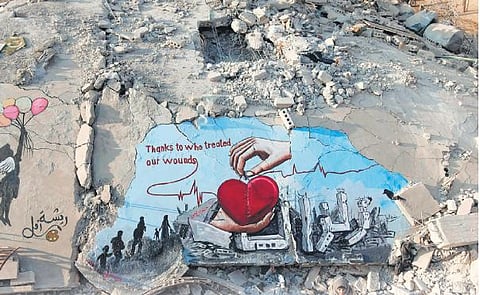

BENGALURU: On February 6, 2023, two consecutive earthquakes shook the tectonic plates of the Republic of Türkiye and Syria in humongous seismic proportions (7.8 Mw). Both countries have been left devastated in the wake of the calamity and relief is being sent from all over the world. The double earthquakes (and the subsequent ones) have been one of the worst calamities to have happened in both nations’ history. In Türkiye’s case, it is the deadliest seismic event yet. With more than 51,000 fatalities overall (over 44,000 deaths in Türkiye and over 6,700 in Syria) and still rising, help has come to both nations from all over the world. India also happens to be one of them.
Among the help being given from India, Garden City is playing a vital role. One of them is the city-based SCEAD Foundation, which started gearing up for its relief programme almost three weeks ago. “One of the things we are doing is collaborating with various educational institutions across the city, who are all collecting groceries. We are in touch with the Turkish embassy in Delhi, and the Indian customs are helping us reach there. Fortunately, we have a branch of our organisation in Istanbul, which is making the process of sending the relief packages to the affected region easier,” says Siju Thomas Daniel, founder of SCEAD.
Among the educational institutes with whom SCEAD is working includes the Christ Academy. “We have almost 8,500 students here who have contributed together to the cause. The contributions were collected by SCEAD from our academy a few days ago. We started working on it over two weeks ago and have collected all the necessary amenities like toiletries, blankets, and food packets, among others,” says Rev. Fr. Joice Eluvathingal, principal of Christ Academy.
One of the authoritative bodies that have worked to make the process easier is the Indian customs and Harsh Vardhan Umre, commissioner of customs and GST, Indian Revenue Service, has been spearheading the process. “After the tragedy struck, we realised we had to start sending out aid, in however small ways we can. A big initial challenge was the time-consuming procedure of getting the relief kits from here to Türkiye, especially if we do it independently.
That is why we decided to work with the Turkish consulate and that helped accelerate the process as we had fewer formalities to go through. I believe after the relief processes are done, we need to carefully examine why such a situation occurred. I mean it was a natural calamity but it still must have had its reasons. Once we do that, we would be able to prevent such high-scale destruction and not be restricted to only reacting to disasters but preventing them as well,” says Umre, who is also the founder of Ahimsa International, an organisation that has also been involved in the relief process.
Helping hands
The entire country has been mobilised but since Istanbul is the economic centre of Türkiye, the heaviest responsibilities lie on this city’s shoulders. Both materials for relief and moral support have been given mostly from here. There are some organisations like Disaster and Emergency Management Presidency (AFAD) and AHBAP (a humanitarian NGO), to which we send our funds,” shares Gülsen Minaz, mentioning that health and technical personnel were sent from Istanbul and other cities to the earthquake site.
With another two earthquakes of 6.4 Mw and 5.6 Mw magnitudes hitting the nation, things have taken a bleak turn. “Before the most recent earthquakes, the government had expertise on the buildings. While most of the buildings left standing are marked as half-ruined, some remained undamaged. So, the victims who lived in those undamaged buildings were sent home. But now, especially in cities of the Hatay province, people are trapped under debris,” shares Doganay Bozdag. He explains that most volunteers are also quake victims.
The basic utilities are in the hour of need and the country is doing as much as it can. “Large monetary donations were collected both abroad and in Türkiye to reconstruct new buildings and to provide financial aid to the victims for one year. It was reported that the construction of the new buildings would be completed by then. We are grateful for countries that are helping us,” says Minaz.
While relief packages are coming in frequently, the volunteers feel the bigger focus right now is to build homes for the victims as they don’t have anywhere to go. Some victims who have undamaged vehicles are choosing to sleep there, which is not recommended as safe either.
Incidentally, both Minaz and Doganay had previously lived in Bengaluru when they were working with SCEAD. “We worked for the organisation in 2013 and it was a great experience. I felt visiting orphanages and government schools were especially beneficial both for the children and us volunteers. In addition, it gave us a chance to learn about a different culture,” concludes Doganay.